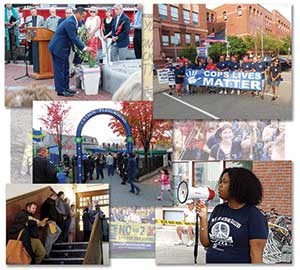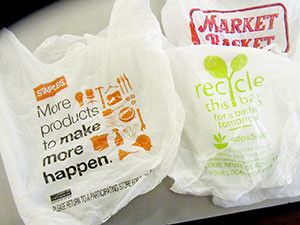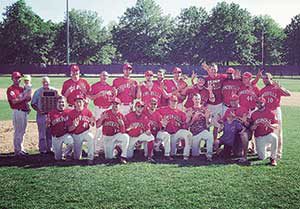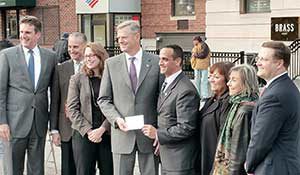
By The Times Staff
While decried by many as an annus horribilis, 2016 nonetheless was a remarkable year in terms of change and unexpected surprises.
The national election, and the wildly contentious campaign season preceding it, held the attention of the masses in check. Meantime, plenty of noteworthy events took place right here in our own environs.
Following is a summary of the most outstanding moments and occurrence in Somerville in 2016:
The passage of institutions
Two notable mainstays of Somerville pop culture and gastronomic preeminence closed their doors for good last year.
Johnny D’s Uptown Restaurant and Music Club announced that they were calling it quits, much to the shock and dismay of their many loyal customers, and the final day of operations of the club served as a cause for celebration to end all celebrations.
After a brief farewell opening of its doors on Sunday morning, March 13, those very doors were locked for good as the owners, staff, patrons and musicians cut a joyously noisy swath down Holland St. towards Davis Square’s Statue Park.
Chief proprietor of Johnny D’s, Carla DeLellis, tearfully thanked the crowd, enthusing through a megaphone, “Thank you so much for being a part of Johnny D’s. What is abundantly clear to me is that Johnny D’s is bigger than me and my family and the walls that it is housed in. Thank you so much, from me and on behalf of my family and staff, and I call this Johnny D’s Nation!”
Another much beloved venue, La Hacienda restaurant, likewise ended its long run and ceased operations in July, after being offered a deal on their property that the owners felt they could not refuse.
After more than six decades as a Somerville institution, the DiCecca brothers made the fateful decision to take their bows and close their doors, leaving many faithful patrons yearning for a change of heart, or new operators to step in and keep the operation going. But this was not to be.
Protests and persistence
The display of a banner hung outside of City Hall expressing support for the Black Lives Matter movement elicited strong feelings and expressions of either approval or disapproval from all side of the issue.
In August, the Massachusetts Municipal Police Coalition, along with other local police unions, showed up at City Hall to protest the displaying of the banner on the public building.
About 100 to 125 Officers and supporters were present to hear speakers and to ask the mayor to take the banner down.
Michael McGrath, President of the Somerville Police Employees Association, addressed the gathering, listing the reasons that his and other groups felt the banner should be removed.
McGrath asserted that the police groups do not object to the banner itself, but that it was not appropriate for it to be hung on a public building.
A crowd of media people almost as large as the assembled crowd itself took note of McGrath’s and other’s remarks.
McGrath assured everyone that the police support the goal of the BLM movement, equal treatment under the law, but that they find the banner’s message to be disrespectful of police officers.
The protest, highly anticipated by the public, was organized shortly after a letter to the mayor expressing the police groups’ displeasure with the banner was leaked to the media.
A counterdemonstration in Union Square was organized by the Cambridge chapter of BLM that same day. Hundreds of supporters gathered in the Square to express their approval of the banner, which has remained in place at City Hall despite the ongoing controversy.
The real thing prevails
After much discussion and debate, Lincoln Park, near the Argenziano School playground, began receiving its long awaited renovation in June that included installation of natural grass over artificial turf.
New features included a multi-use grass field, a new Argenziano schoolyard, an updated softball diamond, community gardens, an outdoor play area, Parkour and skateboard areas, 150 new trees, outdoor exercise equipment, new lighting, and an off-leash dog area.
A farewell to the bag

September brought with it the official start of the ban on plastic bags at Somerville checkout counters. Large stores would no longer carry plastic bags as of the first of the month; smaller stores and operations were allowed to carry them through December.
Legislation for this act had been in process for some time, and was formally passed the previous year. Environmental concerns were paramount in this decision, as well as the presumed benefit to the city on a more superficial level – less litter and trash. While some residents voiced their grief over the ban, while others believe it will simply take some getting used to.
A Beacon Street makeover
Major reconstruction activities on Beacon St. on began in early May. Newport Construction, which was selected through a competitive bid process administered by MassDOT, will be responsible for the expected two-year project, which stretches from Oxford St./Somerville Ave. south to the Cambridge city line near Inman Square.
“Our residents and local merchants along the Beacon St. corridor have been living with antiquated infrastructure for more than a decade, and the negative impacts have included poor drainage, pedestrian accessibility and traffic safety. I am extremely happy to finally see this long-awaited project get underway. I appreciate the public’s patience during the first phases of construction, and I applaud our partners at MassDOT for their hard work to push this work across the finish line,” said Mayor Curtatone.
GLX back on track
After months of debate and controversy, the Somerville Board of Aldermen ultimately voted unanimously to approve a $50 million contribution to the Green Line Extension (GLX) project in December.
The vote was one more hurdle crossed for the once-doomed GLX project. The project was put on hold after cost estimates exceeded $3 billion in 2015. Consultants value-engineered the project cost down to a more reasonable $2.3 billion. The State has committed $2 billion; the shortfall will be partially filled with the $50 million approved by Somerville and an additional $25 million from Cambridge.
Water bills on the brain
The Somerville Water Authority raised the base connection charge for a water meter early in the year. The sewer base connection charge was also raised.
Residents and city officials alike were surprised by the rate increases, and the Authority was called before the Board of Aldermen to explain why the rate increases were not part of the fiscal year budget.
The Board discussed the issue during a meeting in September, and City Solicitor Francis Wright was present to defend his opinion that the Water and Sewer Commission acted appropriately in raising the base charges and sewer rates, citing maintenance and development costs for the water and sewer systems.
Devastation in fire
A fire that broke out on Rush Street and adjacent Brook Street in East Somerville on May 5 displaced 15 families from their homes.
Residents and volunteer organization rallied to bring relief to those who were affected.

Your 2016 Yawkey Baseball League Champions, Somerville Alibrandis.
Still the champs
Yawkey League champions for the 7th consecutive year, the Somerville Alibrandis baseball team continued to dominate in their 2016 season.
Politics as usual and unusual
Ballot measures and challenges to long-established public official’s positions dominated the local political scene on November 8.
Ballot questions concerning expanded slot-machine gaming and charter school expansion were voted down, while those involving conditions for farm animals, legalization of marijuana, and debt exclusion for redesign/rebuild of Somerville High School were approved. State Rep. Tim Toomey lost his bid for reelection, while State Senator Pat Jehlen retained her position.
Shopping for pot
City officials took a long hard look at possible solutions for establishing medical marijuana dispensaries in the city. Sites in Union Sq. and Davis Sq. have been proposed and the process of finalizing these locations is still underway.
A new high
After exhaustive studies and discussion, the Somerville High School Building Committee finally settled on a plan to renovate and add onto the existing Somerville High School site. The debt exclusion measure which passed as a ballot question was a key factor in seeing the plan through.
While many residents questioned the cost of the renovations, others agreed that the current plan is the most viable solution available at this time.
Slowing it down
Speed limits on residential streets in Somerville were lowered to 25 mph from the previous 30 mph. Officials cited safety concerns as the prime motivation for the change.
Big bucks for Union Sq.
Governor Charlie Baker approved a $13M MassWorks Infrastructure grant for Union Square, funds deemed necessary for extensive water and sewer improvements.

Massachusetts Governor Charlie Baker presented Somerville Mayor Joseph Curtatone with a 13M MassWorks Infrastructure grant for Union Square.















Seems that there was just too much going on here in 2016 that requires more and more of our taxpayer money. I wonder how many of us will still be able to be Somerville residents by the end of 2017.
I want to be optimistic, but every time I get a tax bill that’s much more than what I got before, it just makes me feel many of us will be fighting a losing battle to stay, but that just as many of us will have nowhere else to go.
Sure, they tell us that we can apply for this tax break or that tax break, but they don’t tell you that it requires endless hoop-jumping and barely enough in the bank for peace of mind to afford home repairs or emergencies, so only the dirt-poor can qualify.
Nothing happens overnight, but it just feels like the mayor is trying to get it all done that fast. It took years for the city to be in the state it’s in, so it’s going to take as many years for it to improve.
I just wish that our city leader understood that instead of thinking that if he can pull in as much tax money as he can get it will get done faster.
What’s the point in improving Somerville if the ones who are here aren’t even going to be able to stay here to appreciate it? Or is that the point, that those of us who can’t afford to live here will be made to leave to allow those who can afford to live here to take our place?
Happy New Year.